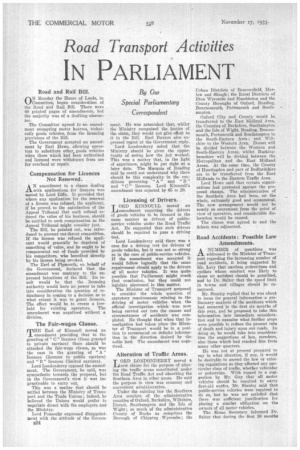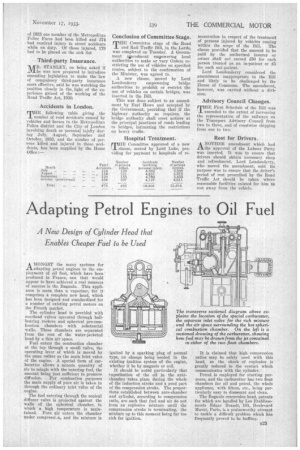Road Transport Activities
Page 38

Page 39

If you've noticed an error in this article please click here to report it so we can fix it.
IN PARLIAMENT
By Our Special Parliamentary Correspondent
Road and Rail Bill. Oo Monday the House of Lords, in Committee, began consideration of the Road and Rail BilL There were 40 printed pages of amendments, but the majority was of a drafting character.
The Committee agreed to an amendment exempting motor hearses, technically goods vehicles, from the licensing provisions of the Bill.
The Government accepted an amendment by Earl Howe, allowing operators to substitute other, goods vehicles when those which had been authorized and licensed were withdrawn from use for overhaul or repair.
Compensation for Licences Not Renewed.
AN amendment to a clause dealing with applications for licences was moved by Lord life. It provided that where any application for the renewal of a licence was refused, the applicant, if he proved to the satisfaction of the Appeal Tribunal that such refusal reduced the value of his business, should be entitled to such compensation as the Appeal Tribunal might consider just.
The Bill, he pointed out, was introduced to prevent cut-throat competition. If the licence was refused the applicant would generally be deprived of something of value, and he ought to be compensated out of funds provided by his competitors, who benefited directly by his licence being revoked.
The Earl of Plymouth, on _behalf of the Government, declared that the amendment was contrary to the expressed intentions of the Bill. Its result would be that the licensing authority would have no power to take into consideration the question of redundancy in coming to a decision as to what extent it was to grant licences. The effect would be to create a freehold for existing operators. The amendment was negatived without a division.
The Fair-wages Clause.
rpHE Earl of Kinnoull moved an
amendment providing that to the granting of " C " licences (those granted to private carriers) there should be attached the fair-wage clause, as was the ease in the granting of "A licences (licences to public carriers) and " B" licences (limited carriers).
Lord Londonderry opposed the amendment. The Government, he said, was sympathetic towards the proposal, but in the Government's view it was impracticable to carry out.
This was a matter that should be settled between the Ministry of Transport and the Trade Unions ; indeed, he believed the Unions would prefer to negotiate direct with the employers aud the Ministry.
Lord Ponsonby expressed disappointment with the attitude of the Govern1324
meta. He was astonished that, whilst the Ministry recognized the justice of the claim, they would not give effect to it in the Bill. Earl Buxton also expressed regret at the Government reply.
Lord Londonderry asked that the Ministry should be given the opportunity of seeing how the Act worked. This was a matter that, in the light of experience, might be put right at a later date. The Marquis of Reading said he could not understand why there should be this complexity in the conditions governing "A" and " B " and " C " licences. Lord Kinnonll's amendment was rejected by 65 to 29.
Licensing of Drivers.
LORD K1NNOULL moved an amendment requiring the drivers of goods vehicles to be licensed in the same manner as drivers of publicservice vehicles under the Road Traffic Act. He suggested that such drivers should be required to pass a driving test.
Lord Londonderry said there was a ease for a driving test for drivers of goods vehicles, but it was not so strong as in the case of public-service vehicles. If the amendment was accepted it would follow logically that the same reqnirement should apply to the drivers of all motor vehicles. It was quite possible that Parliament might reach that conclusion, but they could not legislate piecemeal in this matter.
The Minister of Transport proposed to consider the whole question of statutory requirements relating to the -driving of motor vehicles when the official investigation which was now being carried out into the causes and circumstances of accidents was completed. He thought that when that investigation had taken place the Minister of Transport would be in a position to recommend on definite information in the direction desired by the noble lord. The amendment was negatived.
Alteration of Traffic Areas.
LORD LONDONDERRY moved a new clause for the purpose of altering the traffic areas constituted under the Road Traffic Act and absorbing the Southern Area in other areas. He said the purpose in view was economy and convenient administration.
Under the existing law the Southern Area consists of the administrative counties of Oxford, Berkshire, Wiltshire, Dorset, Southampton and the Isle of Wight; so much of the administrative County of Bucks as comprises the Borough of Chipping -Wycombe; the Urban Districts of Beaconsfield. Marlow and Slough ; the Rural Districts of Eton Wycombe and Hambledon and the County Boroughs of Oxford, Reading, Bournemouth, Portsmouth and Southampton.
Oxford City and County would be transferred to the East Midland Area, the Counties of Berkshire, Southampton and the Isle of Wight, Reading, Bournemouth, Portsmouth and Southampton to the South-Eastern Area ; and Wiltshire to the Western Area. Dorset will be divided between the Western and South-Eastern Areas, whilst Buckinghamshire will be divided between. the Metropolitan and the East Midland Areas. At the same time, the County of Huntingdon and part of Bedfordshire are to be transferred from the East Midlands to the Eastern Traffic Area.
Lord Howe said that certain organizations had protested against the proposed change. The administration of the Southern Area had been, on the whole, extremely good and econornicaL The new arrangement would not be nearly so convenient from the point of view of operators, and considerable dislocation would be caused.
The clause was agreed to and the debate was adjourned.
Road Accidents: Possible Law Amendments.
A'MB' of questions was addressed to the Minister of Transport regarding the increasing number of road accidents, it being suggested by Mr. Levy that careless pedestrians and cyclists whose conduct was likely to cause an accident should be penalized, and by Dr. Salter that the speed limit in towns and villages should be reimposed.
Mr. Stanley replied that he was about to issue for general information a preliminary analysis of the accidents which had occurred in the first six months of this year, and he proposed to take this information into immediate consideration and to examine what further steps were possible to reduce the present rate of death and injury upon our roads. In doing so, he would take into consideration the suggestions of hon. members, also those which had reached him from many other quarters.
He was not at present prepared to say in what direction, if any, it would be desirable to amend the law or existing regulations as they affected any particular class of traffic, whether vehicular or pedestrian. With regard to a suggestion by Mr. Guy that all motor vehicles should be required to carry first-aid outfits, Mr. Stanley said that public-service vehicles were required to do so, but he was not satisfied that there was sufficient justification for placing a similar obligation on the owners of all motor vehicles.
The Home Secretary informed Dr. Salter that during the first 10 mouths of 1933 one member of the Metropolitan Police Force had been killed and 374 . bad received injury in street accidents while on duty. Of those injured, 179 had to be placed on the sick list.
Third-party Insurance.
lUrR. STANLEY, on being asked if 1.V1he was new prepared to iatroduce amending legislation to make the law of compulsory third-party insurance more effective, said he was watching the position closely in the, light of the experience gained of the working of the Road Traffic Act, 1930.
.Accidents in London.
THE following table giving the number of road accidents caused by vehicles and horses in the Metropolitan Police district and the City of London involving death or personal initity during July, August, September end October, 1933, and the number of persons killed and injured in these accidents, has been supplied by the Home Office :— Conclusion of Committee Stage.
TlIE Committee stage of the Road and Rail Traffic Bill, in the Lords, was completed on Tuesday. A Government owendinent empowering local .authorities to make or vary Orders restricting the use of vehicles on specified routes, subject to the confirmation of the Minister, was agreed to.
A new clause, moved by Lord Londonderry empowering bridge authorities to prohibit or restrict the use of vehicles on certain bridges, was inserted in the Bill. This was done subject to an amendment by Earl Howe and accepted by the Government, providing that if the highway authority so requires, the bridge authority shall erect notices at the principal junctions of roads leading to bridges, intimating the restrictions on heavy traffic,'
Hospital Treatment. 'ram Committee approved of a new clause, moved by Lord Luke, providing for payment to hospitals of re
.mnneration in respect of the treatment of persons injured by vehicles coming within the scope of the Bill. The clause provided that the amount to be paid by the authorized insurer or owner shall not exceed £50 for each person treated as an in-patient or £5 for each out-patient. Lord Londonderry considered the Amendment inappropriate to the Bill and likely to be challenged by the House of Commons. The amendment, however, was carried without a division.
Advisory Council Changes.
TOE First Schedule of the Bill was 'amended to the extent of increasing the representation of the railways on the Transport Advisory Council from two to three, and of coastwise shipping from one to two.
Rest for Drivers.
A NOTHJOR amendment which lied the approval of the Labour Party was inserted. It was to ensure that drivers should obtain necessary sleep and refreshment. Lord Londonderry, who moved the amendment, said its purpose was to ensure that the driver's period of rest prescribed by the Road Traffic Act should be taken where reasonable facilities existed for him to rest awny from the vehicle.




























































































